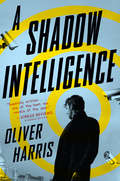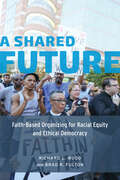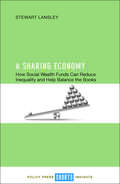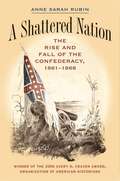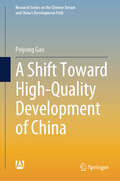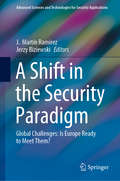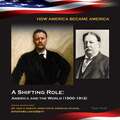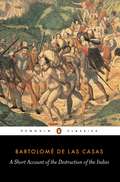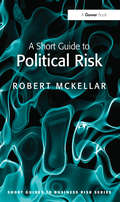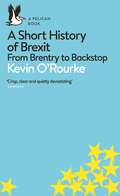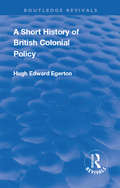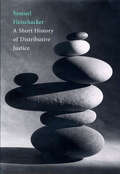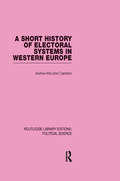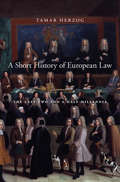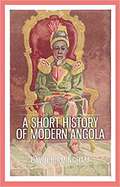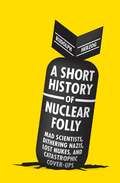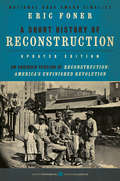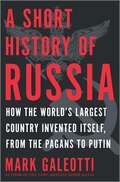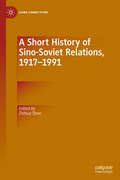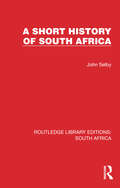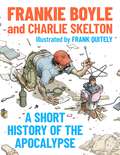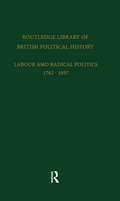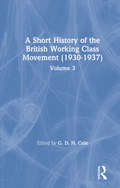- Table View
- List View
A Shadow Intelligence (An Elliot Kane Thriller)
by Oliver HarrisThere is a dark side to MI6 that needs men like Elliot Kane—volatile, inquisitive, free-floating—in the field. They take them and put two years and over £100k into their training, showing them how to steal cars, strip weapons, and hack bank accounts. There are courses on the use of blackmail and improvised explosives, and entire workshops solely dedicated to navigating by the stars. But no one tells them how to go home. Kane has spent fifteen years managing events overseas that never make the papers. He is a ghost in his own life, assuming and shedding personalities as each new cover story comes into play. But when the woman he loves, another operative named Joanna Lake, vanishes without a trace in Kazakhstan, he is forced center stage in his own life. Drawn ever deeper into a realm of deception and conflicting agendas, Kane moves from merely infiltrating events to steering them. While he's well-versed in modern psychological warfare, snowbound Kazakhstan presents unique challenges—poised between China, Russia, and the West, dictatorship and democracy, state intelligence and an increasingly powerful world of private agencies, it&’s impossible to work out who is manipulating whom. And Kane&’s not the only one trying to figure out where Joanna Lake has gone or what she learned before disappearing.
A Shadow Intelligence: an utterly unputdownable spy thriller
by Oliver Harris'Oliver Harris is always pure quality and I'm loving the hell out of his foray into the contemporary spy novel' Ian RankinThe intelligence service puts two years and over £100k into the training of new field officers. You're shown how to steal cars, strip weapons, hack bank accounts. There are courses on the use of blackmail and improvised explosives, two workshops solely dedicated to navigating by the stars. But nothing about what I had heard one old spy call whiplash. No one tells you how to go home.There is a dark side to MI6 that needs men like Elliot Kane - mercurial, inquisitive, free floating. He's spent fifteen years managing events overseas that never make the papers, deniable and deeply effective. Kane is a ghost in his own life, picking up and dropping personalities as each new cover story comes into play. But when a woman he loves, Joanna Lake, vanishes without a trace in Kazakhstan, he is forced centre stage. Drawn ever deeper into a realm of deception, Kane moves from merely infiltrating events to steering them. He's used to a new mode of hybrid psychological warfare - but snowbound Kazakhstan presents unique challenges. Poised between China, Russia and the West, dictatorship and democracy, state intelligence and an increasingly powerful world of private agencies, it's impossible to work out who is manipulating who. And Kane's not the only one trying to figure out where Joanna Lake has gone or what she learned before disappearing.Unable to trust anyone, hunted by his own colleagues, and with the life of someone he loves at stake, Kane needs to work out who is driving events, and why...
A Shared Future: Faith-Based Organizing for Racial Equity and Ethical Democracy
by Richard L. Wood Brad R. FultonFaith-based community organizers have spent decades working for greater equality in American society, and more recently have become significant players in shaping health care, finance, and immigration reform at the highest levels of government. In A Shared Future, Richard L. Wood and Brad R. Fulton draw on a new national study of community organizing coalitions and in-depth interviews of key leaders in this field to show how faith-based organizing is creatively navigating the competing aspirations of America's universalist and multiculturalist democratic ideals, even as it confronts three demons bedeviling American politics: economic inequality, federal policy paralysis, and racial inequity. With a broad view of the entire field and a distinct empirical focus on the PICO National Network, Wood and Fulton's analysis illuminates the tensions, struggles, and deep rewards that come with pursuing racial equity within a social change organization and in society. Ultimately, A Shared Future offers a vision for how we might build a future that embodies the ethical democracy of the best American dreams.
A Sharing Economy: How Social Wealth Funds Can Reduce Inequality and Help Balance the Books
by Stewart LansleyBritain is a society increasingly divided between the super-affluent and the impoverished. A Sharing Economy proposes radical new ways to close the growing income gap and spread social opportunities. Drawing on overseas examples, Stewart Lansley argues that mobilising the huge financial potential of Britain’s public assets could pay for a pioneering new social wealth fund. Such a fund would boost economic and social investment, and, by building the social asset base, simultaneously strengthen the public finances. A powerful new policy tool, such funds would ensure that more of the gains from economic activity are shared by all and not colonised by a powerful few. This is a vital new contribution to the pressing debate on how to reduce inequality and combat austerity.
A Shattered Nation
by Anne Sarah RubinHistorians often assert that Confederate nationalism had its origins in pre-Civil War sectional conflict with the North, reached its apex at the start of the war, and then dropped off quickly after the end of hostilities. Anne Sarah Rubin argues instead that white Southerners did not actually begin to formulate a national identity until it became evident that the Confederacy was destined to fight a lengthy war against the Union. She also demonstrates that an attachment to a symbolic or sentimental Confederacy existed independent of the political Confederacy and was therefore able to persist well after the collapse of the Confederate state. White Southerners redefined symbols and figures of the failed state as emotional touchstones and political rallying points in the struggle to retain local (and racial) control, even as former Confederates took the loyalty oath and applied for pardons in droves.Exploring the creation, maintenance, and transformation of Confederate identity during the tumultuous years of the Civil War and Reconstruction, Rubin sheds new light on the ways in which Confederates felt connected to their national creation and provides a provocative example of what happens when a nation disintegrates and leaves its people behind to forge a new identity.Historians often assert that Confederate nationalism had its origins in pre-Civil War sectional conflict with the North, reached its apex at the start of the war, and then dropped off quickly after the end of hostilities. Anne Sarah Rubin argues instead that white Southerners did not actually begin to formulate a national identity until it became evident that the Confederacy was destined to fight a lengthy war against the Union. She also demonstrates that an attachment to a symbolic or sentimental Confederacy existed independent of the political Confederacy and was therefore able to persist well after the collapse of the Confederate state. White Southerners redefined symbols and figures of the failed state as emotional touchstones and political rallying points in the struggle to retain local (and racial) control, Rubin argues, even as former Confederates took the loyalty oath and applied for pardons in droves.-->
A Shift Toward High-Quality Development of China (Research Series on the Chinese Dream and China’s Development Path)
by Peiyong GaoThis book focuses on the China’s economic strategy aiming to high-quality development in recent years. It is a paper collection of the author published since 2013. Under the basic framework of macroeconomic analysis, this book is divided into 7 chapters in accordance with the basic logic chain of "the new normal of economic development - the change of the main contradiction in society - the new development concept - the supply-side structural reform." It involves the hot topics around China’s economic reform toward high-quality development including supply-side structural reform, macro-control system, fiscal policy, cutting taxes and fees, etc.
A Shift in the Security Paradigm: Global Challenges: Is Europe Ready to Meet Them? (Advanced Sciences and Technologies for Security Applications)
by J. Martín Ramírez Jerzy BiziewskiThis book discusses some of the strategic lines in front of the trends related to the new challenges of global security in this new century: some rather universal problems (migration, terrorism, cyberspace, conflict resolutions techniques in prisons, economic intelligence), as well as more military ones (new conflicts: new world stage, new weapons, new military doctrines, mass destruction weapons and nuclear arms control, outer space and ocean depths), without forgetting some global and conceptual topics (disintegration is driving insecurity, searching for quality in international affairs, shield of security culture through data protection, information society and the protective influence of security culture). A special focus is put on Europe's interests. The unique, complex process of integration of European states is confronted by various problems caused by the implementation of different political visions presented by the factions of the European Union's establishment. The diverse interpretation of the goals and paths of development of this organization leads to the violation of its cohesion, which is used by global partners with the opportunity to broaden their influence and achieve their own goals by playing European countries individually. There is a need for the EU to go further to achieve a deeper level of integration and strategic autonomy which would allow for the implementation of a coherent policy towards the powers.
A Shifting Role: America and the World (1900-1912) (How America Became America)
by Victor SouthThe United States' boundaries have expanded over the centuries--and at the same time, Americans' ideas about their country have grown as well. The nation the world knows today was shaped by centuries of thinkers and events. Teddy Roosevelt's America, for example, was a different one from today's version, and yet Roosevelt's ideas and actions shaped present-day America. The actions and policies of Presidents Roosevelt, Taft, and Wilson also led to America's involvement in the Caribbean and in Central America. As the world headed toward World War I, the United States was ready to take its place as a leader on the global stage.
A Short Account of the Destruction of the Indies
by Bartolome Las CasasBartolomé de Las Casas was the first and fiercest critic of Spanish colonialism in the New World. An early traveller to the Americas who sailed on one of Columbus's voyages, Las Casas was so horrified by the wholesale massacre he witnessed that he dedicated his life to protecting the Indian community. He wrote A Short Account of the Destruction of the Indies in 1542, a shocking catalogue of mass slaughter, torture and slavery, which showed that the evangelizing vision of Columbus had descended under later conquistadors into genocide. Dedicated to Philip II to alert the Castilian Crown to these atrocities and demand that the Indians be entitled to the basic rights of humankind, this passionate work of documentary vividness outraged Europe and contributed to the idea of the Spanish 'Black Legend' that would last for centuries.
A Short Guide to Political Risk (Short Guides to Business Risk)
by Robert McKellarIn a competitive and increasingly internationalised business world, many companies rely on the high risk/reward ratio of operating in unstable areas. Those companies willing to engage in emerging or developing countries can often be exposed to a politically volatile environment over which they have little control. Political risk, therefore, is one of the most hazardous challenges that an international business can face. In A Short Guide to Political Risk you will find a business-centric introduction to political risk that will familiarise international managers with the concept and accelerate the learning curve towards proficient and coherent political risk management. Robert McKellar explores: the key political risks that companies have faced in the recent past, and current trends in the evolution of the political risk landscape; the concept of political risk and its constituent elements; models and approaches for assessing political risk; the principal options for managing political risk, and suggestions for organisational structures to ensure a coherent and consistent approach; as well as wider issues that a company needs to consider in developing its own attitude and philosophy on political risk. A Short Guide to Political Risk is an essential introductory guide for risk managers and for all senior managers concerned with their organisation's global performance and reputation.
A Short History of Brexit: From Brentry to Backstop (Pelican Books)
by Kevin O'RourkeA succinct, expert guide to how we got to BrexitAfter all the debates, manoeuvrings, recriminations and exaltations, Brexit is upon us. But, as Kevin O'Rourke writes, Brexit did not emerge out of nowhere: it is the culmination of events that have been under way for decades and have historical roots stretching back well beyond that. Brexit has a history.O'Rourke, one of the leading economic historians of his generation, explains not only how British attitudes to Europe have evolved, but also how the EU's history explains why it operates as it does today - and how that history has shaped the ways in which it has responded to Brexit. Why are the economics, the politics and the history so tightly woven together? Crucially, he also explains why the question of the Irish border is not just one of customs and trade, but for the EU goes to the heart of what it is about. The way in which British, Irish and European histories continue to interact with each other will shape the future of Brexit - and of the continent.Calm and lucid, A Short History of Brexit rises above the usual fray of discussions to provide fresh perspectives and understanding of the most momentous political and economic change in Britain and the EU for decades.
A Short History of British Colonial Policy (Routledge Revivals)
by Hugh Edward EgertonThis volume discusses a short history of British Colonial policy. With all its faults the book represents much reading and some thought. In writing what is, to some extent, a history of opinion, it has been impossible altogether to suppress my own individual opinions. I trust, however that I have not seemed to attach importance to them. In dealing with the later periods, I remembered Sir Walter Raleigh's remark on the fate which awaits the treatment of contemporary history; but obscurity may claim its compensations, and atleast I am not conscious of having written under the bias of personal or party prejudice.
A Short History of Distributive Justice
by Samuel FleischackerDistributive justice in its modern sense calls on the state to guarantee that everyone is supplied with a certain level of material means. Samuel Fleischacker argues that guaranteeing aid to the poor is a modern idea, developed only in the last two centuries. Earlier notions of justice, including Aristotle's, were concerned with the distribution of political office, not of property. It was only in the eighteenth century, in the work of philosophers such as Adam Smith and Immanuel Kant, that justice began to be applied to the problem of poverty. To attribute a longer pedigree to distributive justice is to fail to distinguish between justice and charity. Fleischacker explains how confusing these principles has created misconceptions about the historical development of the welfare state. Socialists, for instance, often claim that modern economics obliterated ancient ideals of equality and social justice. Free-market promoters agree but applaud the apparent triumph of skepticism and social-scientific rigor. Both interpretations overlook the gradual changes in thinking that yielded our current assumption that justice calls for everyone, if possible, to be lifted out of poverty. By examining major writings in ancient, medieval, and modern political philosophy, Fleischacker shows how we arrived at the contemporary meaning of distributive justice.
A Short History of Electoral Systems in Western Europe (Routledge Library Editions: Political Science #22)
by Andrew McLaren CarstairsThis book provides a concise and accessible account of the historical experience of European parliaments – why different electoral systems were adopted, how they have functioned, how they have affected the development of political parties, and in what respects they have been found over time to be either suitable or unsatisfactory. The book begins with a summary of the main electoral systems, analysing and re-assessing each in the light of historical experience. The core of the book, however, is a country-by-country account of the systems which have operated in each of the main West European countries, in the context of their own constitutional, political and social developments.
A Short History of European Law: The Last Two and a Half Millennia
by Tamar HerzogTamar Herzog offers a road map to European law across 2,500 years that reveals underlying patterns and unexpected connections. By showing what European law was, where its iterations were found, who made and implemented it, and what the results were, she ties legal norms to their historical circumstances and reveals the law’s fragile malleability.
A Short History of Modern Angola
by David BirminghamThis history by celebrated Africanist David Birmingham begins in 1820 with the Portuguese attempt to create a third, African, empire after the virtual loss of Asia and America. In the nineteenth century the most valuable resource extracted from Angola was agricultural labor, first as privately owned slaves and later as conscript workers. The colony was managed by a few marine officers, by several hundred white political convicts, and by a couple of thousand black Angolans who had adopted Portuguese language and culture. The hub was the harbor city of Luanda which grew in the twentieth century to be a dynamic metropolis of several million people. The export of labor was gradually replaced when an agrarian revolution enabled white Portuguese immigrants to drive black Angolan laborers to produce sugar cane, cotton, maize and above all coffee. <p><p> During the twentieth century Congo copper supplemented this wealth, by gem-quality diamonds, and by offshore oil. Although much of the countryside retained its dollar-a-day peasant economy, new wealth generated conflict which pitted white against black, north against south, coast against highland, American allies against Russian allies. The generation of warfare finally ended in 2002 when national reconstruction could begin on Portuguese colonial foundations.
A Short History of Nuclear Folly: Mad Scientists, Dithering Nazis, Lost Nukes, and Catastrophic Cover-ups
by Jefferson Chase Rudolph HerzogIn the spirit of Dr. Strangelove and The Atomic Café, a blackly sardonic people's history of atomic blunders and near-misses revealing the hushed-up and forgotten episodes in which the great powers gambled with catastrophe. Rudolph Herzog, the acclaimed author of Dead Funny, presents a devastating account of history's most irresponsible uses of nuclear technology. From the rarely discussed nightmare of "Broken Arrows" (40 nuclear weapons lost during the Cold War) to "Operation Plowshare" (a proposal to use nuclear bombs for large engineering projects, such as a the construction of a second Panama Canal using 300 H-Bombs) . . . Herzog focuses in on long-forgotten nuclear projects that nearly led to disaster.Digging deep into archives, interviewing censored scientists, and including dozens of photos, Herzog also explores the "accidental" drop of a Nagasaki-type bomb on a train conductor's home, the implanting of plutonium into patients' hearts, and the invention of wild tactical nukes, including weapons designed to kill enemy astronauts.Told in a riveting narrative voice, Herzog--the son of filmmaker Werner Herzog--also draws on childhood memories of the final period of the Cold War in Germany, the country once seen as the nuclear battleground for NATO and the Warsaw Pact, and discusses evidence that Nazi scientists knew how to make atomic weaponry ... and chose not to. An unprecedented people's history.
A Short History of Reconstruction
by Eric FonerFrom the "preeminent historian of Reconstruction" (New York Times Book Review), a newly updated AND abridged edition of the prizewinning classic on the post-Civil War period that shaped modern AmericaIn this updated edition of the abridged Reconstruction, Eric Foner redefines how the post-Civil War period was viewed. Reconstruction chronicles the way in which Americans--black and white--responded to the unprecedented changes unleashed by the war and the end of slavery. It addresses the quest of emancipated slaves searching for economic autonomy and equal citizenship, and describes the remodeling of Southern society, the evolution of racial attitudes and patterns of race relations, and the emergence of a national state possessing vastly expanded authority and committed, for a time, to the principle of equal rights for all Americans. This "masterful treatment of one of the most complex periods of American history" (New Republic) remains the standard work on the wrenching post-Civil War period--an era whose legacy still reverberates in the United States today.
A Short History of Russia: How The World's Largest Country Invented Itself, From The Pagans To Putin
by Mark GaleottiA Library Journal 2020 Title to WatchRussia’s epic and dramatic history told in an accessible, lively and short form, from Ivan the Terrible to Vladimir Putin via Catherine the Great, the Russian Revolution and the fall of the USSR.Russia is a country with no natural borders, no single ethnic group, no true central identity. At the crossroads of Europe and Asia, it has been subject to invasion by outsiders, from Vikings to Mongols, from Napoleon’s French to Hitler’s Germans. In order to forge an identity, it has mythologized its past to unite its people and to signal strength to outsiders.In A Short History of Russia, Mark Galeotti explores the history of this fascinating, glorious, desperate and exasperating country through two intertwined issues: the way successive influences from beyond its borders have shaped Russia, and the way Russians came to terms with this influence, writing and rewriting their past to understand their present and try to influence their future. In turn, this self-invented history has come to affect not just their constant nation-building project but also their relations with the world.
A Short History of Sino-Soviet Relations, 1917–1991 (China Connections)
by Zhihua ShenDrawing on the rich trove of recently declassified Russian and Chinese archival materials, this history of Sino-Soviet relations in the 20th century sheds new light on key events during this period. It offers fresh insights into the role of ideology and national interests in the evolution of the complex and turbulent relationship between not just the two countries but also their respective Communist Parties. The chapters on the normalization of bilateral ties provide an in-depth analysis of divisions in the socialist camp that culminated in both its collapse and the disintegration of the Soviet Union. The book argues that 20th century Sino-Soviet relations reflected both long-standing and emerging political and geopolitical challenges facing members of the Cold War socialist camp, in particular tensions between the ideal of internationalism and national aspirations, between commitment to the principle of sovereignty and commitment to that of equality in international relations, and between inter-party relations and inter-state relations. This makes for a valuable addition to the reading lists of all those interested in the development of the relationship between two of the world’s most important countries.
A Short History of South Africa (Routledge Library Editions: South Africa #16)
by John SelbyOriginally published in 1973, this book begins with the arrival of the Europeans in South Africa. It examines the part played by the Dutch, British and Afrikaners, as well the diverse ethnic groups including the Xhosa and Zulus. The complicated period of the Difiqane or ‘Forced Migrations’ is clearly discussed as is the genesis and evolution of Apartheid. Other major events which are discussed include the advent of the 1820 Settlers, the Great Trek, the discovery of diamonds, the Jameson Raid, the occupation of land which became Zimbabwe, the Anglo-Boer Wars and the two World Wars. Accounts are given of Sharpeville and the subsequent introduction of legislation formalising separate development.
A Short History of the Apocalypse: A Times Bestseller
by Frankie Boyle Charlie Skelton*A Short History of the Apocalypse: your comprehensive guide to the challenges of Armageddon*Join Frankie Boyle (Saturday Night Swindle; Celebrity Vengeance) and Charlie Skelton (head writer: Ad Naseum; David Suchet's News Sachet) as they debrief time traveller and bon vivant from the late 21st Century, Alonso Lampe.Will humanity survive the coming cataclysm? Find out inside, along with helpful tips on cannibalism, thunderdome etiquette, and post-societal dating. How do you go about joining a militia? What will life be like in a billionaire's bunker? How will people entertain themselves in re-education camps? All these questions will be fully and satisfactorily answered.With exclusive illustrations by Hall of Fame comic artist Frank Quitely, A Short History of the Apocalypse is vital to your future survival.
A Short History of the Apocalypse: The vital guide to your future survival
by Frankie Boyle Charlie Skelton*A Short History of the Apocalypse: your comprehensive guide to the challenges of Armageddon*Join Frankie Boyle (Saturday Night Swindle; Celebrity Vengeance) and Charlie Skelton (head writer: Ad Naseum; David Suchet's News Sachet) as they debrief time traveller and bon vivant from the late 21st Century, Alonso Lampe.Will humanity survive the coming cataclysm? Find out inside, along with helpful tips on cannibalism, thunderdome etiquette, and post-societal dating. How do you go about joining a militia? What will life be like in a billionaire's bunker? How will people entertain themselves in re-education camps? All these questions will be fully and satisfactorily answered.With exclusive illustrations by Hall of Fame comic artist Frank Quitely, A Short History of the Apocalypse is vital to your future survival.
A Short History of the British Working Class Movement (1937): Volume 2
by G. D. ColeThis is volume 2 of the set A Short History of the British Working Class Movement (1937). The volumes reprinted here provide a general narrative of the history of the working class movement in all its main aspects - Trade Unions, Socialism and Co-operatives. The historical focus is upon the latter part of the eighteenth century, set against a background of economic and social history.
A Short History of the British Working Class Movement (1937): Volume 3
by G. D. ColeThis is volume 3 of the set A Short History of the British Working Class Movement (1937). The volumes reprinted here provide a general narrative of the history of the working class movement in all its main aspects - Trade Unions, Socialism and Co-operatives. The historical focus is upon the latter part of the eighteenth century, set against a background of economic and social history.
